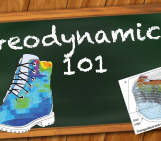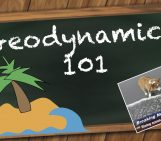
No, wait. That's probably not a good idea. I've heard it's very hot there.
Imagine my surprise when I found out that one of the regular attendees of our virtual institute coffee in Leeds actually worked on the movie ‘The Core’. Yes, you read that correctly: The Core, maybe the best bad science movie out there! (Although Menno had some great other suggestions last week!) So, in between many cups of coffee (well, mugs of tea actually, we are in the UK after all), I interviewed Jon Mound, associate professor at the University of Leeds about his role as scientific advisor on The Core.
 So Jon, first things first: how did you get involved in the production of The Core?
So Jon, first things first: how did you get involved in the production of The Core?
I was doing a post-doc with Bruce Buffett at the University of British Columbia when the movie started filming in Vancouver. Initially, the set decoration team contacted the university to scout potential filming locations and to get an idea of the sorts of things that geophysicists might have in their offices. For example, they rented out several shelves of books and journals from Bruce. They wanted the sets to look plausible and asked if there was someone that could spend a few days helping them with that sort of thing and I was lucky enough to be able to get involved as a scientific advisor.
Cool! A good reason to keep our offices reasonably tidy, I guess. You never know when the call of Hollywood comes! What was your specific job as a scientific advisor?
I did a mixture of things, much of which wasn’t really advising on the science. I provided them with small items for set decoration; for example, at one point Aaron Eckhart’s character [ed. the main character Josh Keyes; professor in geophysics and leader of the expedition to the core] grabs a textbook from a pile – that’s my 2nd year calculus book. I gave them equations to write on whiteboards; although sadly the equations from the paper I was working on at the time were in a scene that got cut (you can see them, and me, if you’ve got the DVD). I also spoke a bit with Aaron Eckhart, Stanley Tucci [ed. he plays Conrad Zimsky, the Earth scientist in charge of designing project DESTINI: the Deep Earth Seismic Trigger INItiative – a backup plan for when our heros don’t manage to restart the core. He also plays in ‘The Devil Wears Prada’ – thought you might want to know], and Delroy Lindo [ed. Edward ‘Braz’ Brazzelton, the scientist who designed the Virgil – you know, the rocket ship that travels to the centre of the Earth and will restart the core. Obviously.] about what geophysicists are and what we do, as part of their process of figuring out their characters.
Were they disappointed in learning we mostly spend time behind our computer? Or did you spark some interest for the Earth sciences in them?
I don’t think anyone was surprised that a job title that includes “physicist” might involve a fair bit of working with computers and other stereotypically geeky things. However, we also talked about the range of things that geophysicists do, like fieldwork, as the characters were mostly not stereotypical geeks. The actors mostly asked questions related to “how geophysicists think” (one asked me what I think about when I look at a wall, which I didn’t have a good answer for) or how academia works (e.g., how realistic were some of the interpersonal tensions in the movie – pretty realistic, sadly). They were all interested in knowing a bit about the science, but their questions were more about the human side of science and being a scientist.
So, how much time did you spend working on the Core? Did you visit the set?
Overall, I spent about a week working on The Core. That included a few days on location talking with the decoration team about details of the set. During those days I met many of the main actors and the director. There were a lot of people involved in the filming and although there was always something going on, a lot of people (like me) often weren’t needed. So, I spent quite a bit of time talking with the crew and actors when they weren’t actively needed in the scene. It was really interesting to see a lot of the craft and effort that goes into filming first-hand .
And, as a scientific advisor, did they listen to your scientific advice?
John Rogers, one of the writers, did a degree in physics and at one point he was worried about how strong gravity would be inside the Earth because during his undergrad he’d had a class where they worked out how gravity decreases inside a solid sphere. So, would they need to have scenes where the crew should be floating around inside the drillship because gravity was so weak? As it happens, I could tell him that with the Earth’s core being much denser than the mantle the gravity stays roughly constant throughout the mantle; it does drop off within the core, but not so fast that they needed floating terranauts.
I’m sure the financial department was happy about that!
Haha, yes! I was also given a copy of the script and asked for comments. I think only one thing was changed based on that feedback. There is a scene where DJ Qualls’ character [ed. Theodore Donald ‘Rat’ Finch, the computer hacker who helps the core team from the safe surface of the Earth] sends some encoded data, and the key to deciphering it had to do with the list of prime numbers. The original script skipped 2 and I got that added back in. Unfortunately, I missed the fact that they also included 1 in the list despite it not being a prime. So, my one correction is still wrong!
Oops! Happens to the best of us. Were there any other scientific advisors who could have spotted that mistake?
I never met them, and I don’t really remember. I think it was three: me; someone who knew about spaceflight that advised on their space shuttle scenes; and someone who knew about the military that advised on those aspects of terminology and procedures.
And then, after all that advice, The Core was released. It has become a go-to movie amongst Earth scientists for a bad science movie night, because of its ridiculous premise. In fact, The Core won the 2020 GeoMovieCup hosted by the EGU Seismology division on twitter. What do you think of The Core?
Indeed, the Core often does quite “well” in polls of bad science movies and obviously there are things in it that are wrong, but mostly I don’t think that matters. The people working on The Core wanted to know about the science but, in the end, it was meant to be entertainment, not a documentary.
There are some things that are unnecessarily wrong that I wish had been fixed, like my missing that 1 isn’t a prime number. However, if they “got things wrong” in ways that advanced the plot, or built tension, or provided a cool visual scene? Well, that might not make for good science, but it might make for a better movie. I think it’s easier to see, and get worked up about, the balance of science to fiction when you know the field, but there are many very successful and enjoyable movies and TV shows that rely on all sorts of things that are scientifically wrong or impossible. I’m obviously biased here, but I’ve got a soft spot for the movie, and I’ve happily used it as a jumping off point in public talks to discuss the science that lies underneath The Core.
Awesome! Thanks for the interview, Jon. It sounds like quite the experience. I will see you tomorrow at another virtual coffee. As for you, dear readers, tell me: do you like The Core? What else should Jon have tried to change concerning the science? The entire premise…? Comment below!



